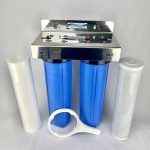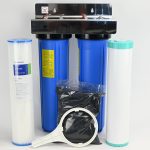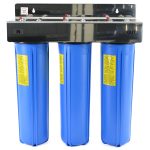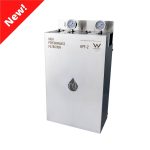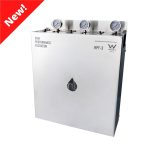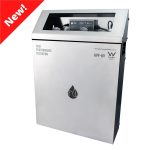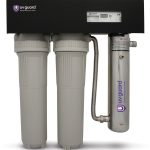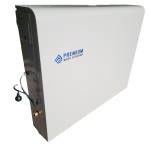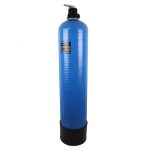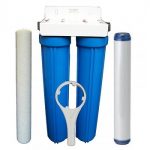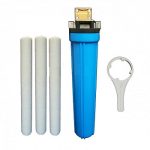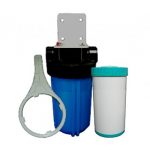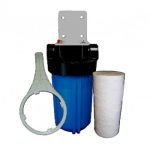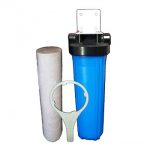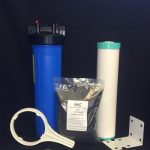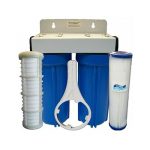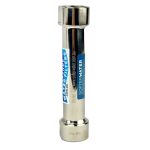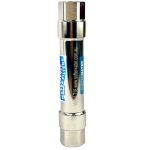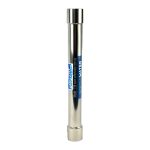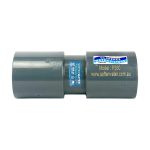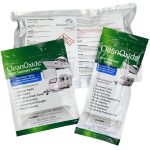Whole of House Water Filters
Whole House Water Filter Systems are designed to filter all of the water coming into your home or business. They are the simplest way to improve the quality of water coming from every tap and water outlet around your property.
Whole house water filters make your water healthier by reducing sediment and chemical content. They can also improve the taste and odour of your water, making it much more enjoyable to consume.
An additional benefit of whole house filtration is that it can protect appliances from sediment-related abrasion damage. There are even options for correcting acidic water and hard water.
Please browse our home water filtration systems below or Click here to read more about Whole House Water Filter Systems.
As always, if you have any questions, please get in touch today via email or by calling our friendly team on 0266468565!
Showing all 28 results
-
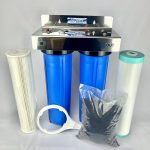
Rural and Tank Water Systems (17)
-
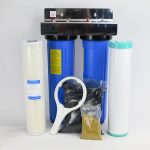
Town Water Systems (22)
-
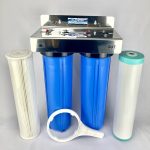 Town Water
Town Water
Reusable FiltersChlorine Town Large Twin Whole of House Water Filter System With Reusable Filters.
Ideal for sediment, chlorine and chemical removal with reusable filters for town water Whole of House Water filter system with reusable filters, ideal for sediment, chlorine and chemical removal. Has… View ArticleChlorine Town Large Twin Whole of House Water Filter System With Reusable Filters.
Ideal for sediment, chlorine and chemical removal with reusable filters for town water Whole of House Water filter system with reusable filters, ideal for sediment, chlorine and chemical removal. Has… View Article -
 Town Water
Town Water
Reusable FiltersHigh Chlorine & Chloramine Twin Whole House Water Filter With Reusable Filters
Whole House Water Filter System designed for water with high levels of chlorine, chloramines and other chemical contaminants. Includes KDF55 for improved chemical reduction.High Chlorine & Chloramine Twin Whole House Water Filter With Reusable Filters
Whole House Water Filter System designed for water with high levels of chlorine, chloramines and other chemical contaminants. Includes KDF55 for improved chemical reduction. -
Town Water
Disposable FiltersChlorine Town Water Supply Large Twin Whole of House Water Filter System With Disposable Filters
Town water supply with Chlorine large twin Big Blue whole of house water filter system disposable filters. This system is a Twin Big Blue filter housings with 1″ Bsp threaded inlet & outlet… View ArticleChlorine Town Water Supply Large Twin Whole of House Water Filter System With Disposable Filters
Town water supply with Chlorine large twin Big Blue whole of house water filter system disposable filters. This system is a Twin Big Blue filter housings with 1″ Bsp threaded inlet & outlet… View Article -
Tank Water
Reusable FiltersTank or Rural Large Twin Whole of House Water Filter System Reusable Cartridges
Large Twin Whole of House Silver Impregnated Water Filter System For Tank or Rural Water Supplies Can be used on Chlorinated or Untreated water supplies. Ideal for tank water or… View ArticleTank or Rural Large Twin Whole of House Water Filter System Reusable Cartridges
Large Twin Whole of House Silver Impregnated Water Filter System For Tank or Rural Water Supplies Can be used on Chlorinated or Untreated water supplies. Ideal for tank water or… View Article -
Tank Water
Disposable FiltersTank or Rural Large Twin Whole of House Water Filter System Disposable Cartridges
Large Twin Whole of House Silver Impregnated Water Filter System For Tank or Rural Water Supplies Can be used on Chlorinated or Untreated water supplies. Ideal for tank water or… View ArticleTank or Rural Large Twin Whole of House Water Filter System Disposable Cartridges
Large Twin Whole of House Silver Impregnated Water Filter System For Tank or Rural Water Supplies Can be used on Chlorinated or Untreated water supplies. Ideal for tank water or… View Article -
NEW!Town Water
Reusable FiltersTriple Whole of House System Town for Chlorine Chloramines and Scale With Reusable Filters
High-quality Triple Big Blue Water Housing with the filters of your choice. Ideal for reduction of sediment, chlorine, chemicals, bad taste/odour at high flow rates. Optional KDFTriple Whole of House System Town for Chlorine Chloramines and Scale With Reusable Filters
High-quality Triple Big Blue Water Housing with the filters of your choice. Ideal for reduction of sediment, chlorine, chemicals, bad taste/odour at high flow rates. Optional KDF -
Town Water
Disposable FiltersTriple Whole of House System For Town Water With Disposable Filters
Triple Whole Of House Water Filter System for Treated Town Water, with Disposable Filters.Triple Whole of House System For Town Water With Disposable Filters
Triple Whole Of House Water Filter System for Treated Town Water, with Disposable Filters. -
Tank Water
Disposable FiltersTriple Whole of House System For Tank Water With Disposable Filters
Triple Whole Of House Water Filter System for Tank Water, with Disposable Filters (Polyspun Sediment Filter and Carbon Block).Triple Whole of House System For Tank Water With Disposable Filters
Triple Whole Of House Water Filter System for Tank Water, with Disposable Filters (Polyspun Sediment Filter and Carbon Block). -
Town or Tank Water
HPF-2 Twin Whole House Water Filtration System In Rugged Stainless Steel Enclosure
2 Stage Whole of House Water Filter System In Stainless Steel Enclosure. WaterMarked certified and approved Australian made system. Have filtered water from every tap in your home. Wide range of filter options to suit town water with Chlorine and untreated tank rain water. Contact us for advice on filter selection.HPF-2 Twin Whole House Water Filtration System In Rugged Stainless Steel Enclosure
2 Stage Whole of House Water Filter System In Stainless Steel Enclosure. WaterMarked certified and approved Australian made system. Have filtered water from every tap in your home. Wide range of filter options to suit town water with Chlorine and untreated tank rain water. Contact us for advice on filter selection. -
Town or Tank Water
HPF-3 Triple Whole House Water Filtration System In Stainless Steel Enclosure
3 Stage Whole of House Water Filter System In Stainless Steel Enclosure. WaterMarked certified and approved Australian made system. Have filtered water from every tap in your home. Wide range of filter options to suit town water with Chlorine and untreated tank rain water.HPF-3 Triple Whole House Water Filtration System In Stainless Steel Enclosure
3 Stage Whole of House Water Filter System In Stainless Steel Enclosure. WaterMarked certified and approved Australian made system. Have filtered water from every tap in your home. Wide range of filter options to suit town water with Chlorine and untreated tank rain water. -
Town or Tank Water
Enclosed Whole of House Filter and UV system HPF-UV
WaterMark Certified and approved HPF-UV System Treats Raw, Rain, Tank Water for Households enclosed in a durable Australian Made Tamper-Resistant & Weather-Proof 304 Brushed Stainless-Steel Enclosure to Protect Your System. Safe water from every tap in the house to protect you and your family.Enclosed Whole of House Filter and UV system HPF-UV
WaterMark Certified and approved HPF-UV System Treats Raw, Rain, Tank Water for Households enclosed in a durable Australian Made Tamper-Resistant & Weather-Proof 304 Brushed Stainless-Steel Enclosure to Protect Your System. Safe water from every tap in the house to protect you and your family. -
NEW!Town or Tank Water
UV Guard™ CWP-55 Whole House UV Water Sterilisation System
The UV Guard CWP-55 is a premium whole house water filter system. In is a fully integrated unit with two 20″ x 4.5″ filter housings and a high-flow ultraviolet steriliser. Dramatically improves the quality of your water and neutralises dangerous pathogens.UV Guard™ CWP-55 Whole House UV Water Sterilisation System
The UV Guard CWP-55 is a premium whole house water filter system. In is a fully integrated unit with two 20″ x 4.5″ filter housings and a high-flow ultraviolet steriliser. Dramatically improves the quality of your water and neutralises dangerous pathogens. -
Sale!
Town or Tank WaterSALE!
The Premium Water Filtration – Premium 2000 5 Stage Whole Of House Water Filter System
** Limited Time Special ** The Premium Water Filtration – Premium 2000 Whole Of House Water Filtration system. A state-of-the-art, all-in-one filter system that provides complete protection. Suitable for use… View ArticleThe Premium Water Filtration – Premium 2000 5 Stage Whole Of House Water Filter System
** Limited Time Special ** The Premium Water Filtration – Premium 2000 Whole Of House Water Filtration system. A state-of-the-art, all-in-one filter system that provides complete protection. Suitable for use… View Article -
Tank Water
Low pH Water Neutralising Calcite System
Low pH Water Neutralising Calcite System for treating acidic low pH water across your whole house. Low maintenance pH neutralising Calcite vessel system suitable for whole of house filtration. Helps… View ArticleLow pH Water Neutralising Calcite System
Low pH Water Neutralising Calcite System for treating acidic low pH water across your whole house. Low maintenance pH neutralising Calcite vessel system suitable for whole of house filtration. Helps… View Article -
Town or Tank Water
Small Twin Whole House Filter System & Filters 20″ x 2.5″
Twin Whole of House Filter System and Filters 20″ x 2.5″. Compact whole house water filter system for small homes, granny flats, and sheds. Filter options available for Town supplies,… View ArticleSmall Twin Whole House Filter System & Filters 20″ x 2.5″
Twin Whole of House Filter System and Filters 20″ x 2.5″. Compact whole house water filter system for small homes, granny flats, and sheds. Filter options available for Town supplies,… View Article -
20″ x 2.5″ Sediment Filter Housing and Filters
AP2025+3x2025PS 20″ x 2.5″ Filter Housing and Sediment Filters for light to medium sediment water supplies. These housings are ideal for Whole of house sediment filter. Suitable for town supplies,… View Article20″ x 2.5″ Sediment Filter Housing and Filters
AP2025+3x2025PS 20″ x 2.5″ Filter Housing and Sediment Filters for light to medium sediment water supplies. These housings are ideal for Whole of house sediment filter. Suitable for town supplies,… View Article -
Small Whole of House Taste & Odour Filter for Low Sediment 10″ x 4.5″
Small Whole of House Water Filter System to reduce bad taste, odours and chemicals. For low sediment rural or town supply. Filter ideal for most situations where water quality needs to be… View ArticleSmall Whole of House Taste & Odour Filter for Low Sediment 10″ x 4.5″
Small Whole of House Water Filter System to reduce bad taste, odours and chemicals. For low sediment rural or town supply. Filter ideal for most situations where water quality needs to be… View Article -
Whole of House Sediment Water Filter Rural or Town 10″ x 4.5″
Whole of House Water Filter System for Sediment. Suits rural or town supply. Large flow rate filter ideal for most situations where water quality needs to be improved Suitable for… View ArticleWhole of House Sediment Water Filter Rural or Town 10″ x 4.5″
Whole of House Water Filter System for Sediment. Suits rural or town supply. Large flow rate filter ideal for most situations where water quality needs to be improved Suitable for… View Article -
Whole of House Sediment Water Filter Rural or Town 20″
20″ x 4.5″ Whole Of House Filter System For Sediment Removal 2045BB+2045P Whole of House Water Filter System for Sediment. Suits rural or town supply. Large flow rate filter ideal… View ArticleWhole of House Sediment Water Filter Rural or Town 20″
20″ x 4.5″ Whole Of House Filter System For Sediment Removal 2045BB+2045P Whole of House Water Filter System for Sediment. Suits rural or town supply. Large flow rate filter ideal… View Article -
Large Whole of House Taste & Odour Water Filter System for Low Sediment Rural Supply
2045BBH+2045SilverGAC+2Kg silverGAC Whole of House Bad Taste & Odour Water Filter System for low sediment rural supply. Large flow rate filter ideal for most situations where water quality needs to be… View ArticleLarge Whole of House Taste & Odour Water Filter System for Low Sediment Rural Supply
2045BBH+2045SilverGAC+2Kg silverGAC Whole of House Bad Taste & Odour Water Filter System for low sediment rural supply. Large flow rate filter ideal for most situations where water quality needs to be… View Article -
10″ x 2.5″ Twin Washable Sediment Filters
AP Twin1025+ washable filters Standard size Twin 10″ filter system 3/4″ Bsp ports with washable filters. Twin 10″ x 2.5″ filter housings on a White mounting bracket, housing sump spanner… View Article10″ x 2.5″ Twin Washable Sediment Filters
AP Twin1025+ washable filters Standard size Twin 10″ filter system 3/4″ Bsp ports with washable filters. Twin 10″ x 2.5″ filter housings on a White mounting bracket, housing sump spanner… View Article -
Hard Water
SofterWater™ T12 Whole House Hard Water Softener (Small Home/Apartment)
The SofterWater™ T12 is an inline water softener which improves water quality and reduces scale build-up. Australian-made product designed for 9 to 18 LPM. Ideal for small 1 to 1.5 bathroom homes with 2-3 occupants, units, apartments, and offices.SofterWater™ T12 Whole House Hard Water Softener (Small Home/Apartment)
The SofterWater™ T12 is an inline water softener which improves water quality and reduces scale build-up. Australian-made product designed for 9 to 18 LPM. Ideal for small 1 to 1.5 bathroom homes with 2-3 occupants, units, apartments, and offices. -
Hard Water
SofterWater™ T18 Whole House Hard Water Softener
SofterWater™ T18 Inline Whole House Hard Water Softener, provides scale protection and improves water quality. Ideal for properties with 2 to 3 bathrooms and average flow rates between 10 to 35 L/min.SofterWater™ T18 Whole House Hard Water Softener
SofterWater™ T18 Inline Whole House Hard Water Softener, provides scale protection and improves water quality. Ideal for properties with 2 to 3 bathrooms and average flow rates between 10 to 35 L/min. -
Hard Water
SofterWater™ T34 Hard Water Softener 24 to 45 LPM 3/4″ BSPT
SofterWater™ T34 Hard Water Conditioner. Protects appliances, machinery, plumbing, fixtures, and surfaces from scale build-up. Designed for commercial and residential applications where there is a typical water flow rate of between 24 to 45 litres per minute.SofterWater™ T34 Hard Water Softener 24 to 45 LPM 3/4″ BSPT
SofterWater™ T34 Hard Water Conditioner. Protects appliances, machinery, plumbing, fixtures, and surfaces from scale build-up. Designed for commercial and residential applications where there is a typical water flow rate of between 24 to 45 litres per minute. -
Hard Water
SofterWater™ T56 41-65 LPM 1″ Hard Water Softener
SofterWater™ T56 Hard Water Conditioner. Provides scale protection and improves water quality on flow rates between 41-65 LPM, ideal for high flow rate commercial and residential applications. 1″ Ports.SofterWater™ T56 41-65 LPM 1″ Hard Water Softener
SofterWater™ T56 Hard Water Conditioner. Provides scale protection and improves water quality on flow rates between 41-65 LPM, ideal for high flow rate commercial and residential applications. 1″ Ports. -
Hard Water
SofterWater™ Pool350 50mm PVC Swimming Pool Water Softener
SofterWater™ Pool350 Hard Water Swimming Pool Conditioner. Provides scale protection and improves water quality on flow rates between 150-500 LPM, ideal for high flow rate commercial and residential pool applications. 50mm PVC Ports.SofterWater™ Pool350 50mm PVC Swimming Pool Water Softener
SofterWater™ Pool350 Hard Water Swimming Pool Conditioner. Provides scale protection and improves water quality on flow rates between 150-500 LPM, ideal for high flow rate commercial and residential pool applications. 50mm PVC Ports. -
Tank Water
Clean Oxide Chlorine Dioxide Disinfection Tablets
Tank water Disinfectant and Treatment tablets. Pack of 8 x 4g tables for caravans, boats and small holding tanks. Each 4g Chlorine Dioxide tablet treats 100-400 litres of water. Pack… View ArticleClean Oxide Chlorine Dioxide Disinfection Tablets
Tank water Disinfectant and Treatment tablets. Pack of 8 x 4g tables for caravans, boats and small holding tanks. Each 4g Chlorine Dioxide tablet treats 100-400 litres of water. Pack… View Article -
Hard WaterNEW!
Triple Whole of House Filter System for Hard Water
Triple Big Blue Water Housing System designed for hard water installations. Reduces a wide range of contaminants including sediment, chlorine, chemicals, bad taste/odour, heavy metals and limescale. Please note: Due… View ArticleTriple Whole of House Filter System for Hard Water
Triple Big Blue Water Housing System designed for hard water installations. Reduces a wide range of contaminants including sediment, chlorine, chemicals, bad taste/odour, heavy metals and limescale. Please note: Due… View Article
Whole Home Water Filtration Systems
Clarence Water Filters is one of the leading suppliers of whole house water filters for town and tank water in Australia.
Our systems can be used to reduce and mitigate the impact of:
- Sediment including sand, silt, dirt, algae, and rust
- Chlorine, chloramines, and Trihalomethanes (as toxic disinfection by-product)
- Pesticides, herbicides, insecticides, glyphosphate and other chemicals
- Scale build-up from hard water
- Corrosion from low pH water
- Pathogens including Bacteria, Viruses, Protozoa, Algal Spores, Cryptosporidium, and Cyclospora.
Need Help? Contact Us Today
Continue reading to learn more about whole house filtration. If you require any advice, please contact us at via email or by calling our friendly team on 02 6646 8565.
Tank/Town Water Systems
You’ve probably noticed the filter systems shown above are classified as “town water” or “tank water”.
Town water is used to describe to describe water that has been treated by a council or water authority in some way. This means it has had chemicals added to reduce turbidity and neutralise pathogens.
This can include chlorine, Aluminum sulfate or alum (Al2(SO4)3), ferric chloride (FeCl3), and ammonia. The primary concern with this type of water is chemical contamination, so sediment filters are finer and media with enhanced chemical reduction is used.
Tank water is used to describe untreated water from a natural source, like rain water, dam water, river water, or bore water.
Untreated water is more likely to have pathogens (bacteria, cyst parasites, protozoa, viruses) and higher levels of sediment. However, the water may also contain chemical contaminants from pesticide/herbicide overspray or contaminated aquifers.
The primary concern with this type of water is sediment and pathogens, however chemicals can also be present. Silver carbon is used in these tank water systems as it reduces the risk of bacterial growth in the carbon. A UV sterilisation component is also recommended for neutralisation of pathogens.
Disposable Filters/Reusable Filters
The systems listed above are also classified as having disposable or reusable filters.
Disposable filter sets are installed and used until they reach full capacity. At that point they are discarded.
Reusable filter sets have a pleated washable sediment and a refillable carbon filter.
The pleated washable sediment filter can be washed 4-5 times to remove the top layer of sediment before it needs to be discarded.
The refillable filter contains filter media like carbon, KDF and polyphosphate. When the media is depleted the contents of the cartridge are disposed of and it is refilled. It is a useful way to save money and gives you more flexibility in terms of filter media options.
Whole Of House Water Filter Systems For Town Water
Although Australian town water is generally of reasonable quality, it can still contain a variety of natural and manmade contaminants. This might include:
- Chlorine and Chloramines
Water authorities will introduce chlorine and/or chloramines to kill or incapacitate pathogens in the water, including bacteria, protozoa, cyst parasites (crypto, giardia, cyclospora), and viruses. - Bad Tastes/Odours
Town water that has been disinfected using chlorine or chloramines can take on a very unpleasant smell and odour. Whole house water filters containing carbon can neutralise this effect, making your water much more enjoyable to consume. - Sediment
Particulates including sand, silt, dirt, rust, and metal particles - Disinfection by-products (DBHs)
When chemicals like chlorine and chloramines are added to water, they can interact with other substances and create new types of chemicals and compounds. This can include trihalomethanes, a type of chemical dangerous to humans in high levels. - Pesticides and Herbicides
Water reservoirs in rural areas may become contaminated by pesticides, herbicides, and other chemicals. Some of these chemicals are dangerous for human consumption in high levels. - Volatile Organic Compounds (VOC)
Volatile organic compounds are organic chemicals that have a high vapor pressure and low boiling point. They are found in many chemical substances including adhesives, paints, and solvents.
Our whole house water filter systems for town water can dramatically reduce these contaminants, helping you enjoy water that is much safer and more enjoyable to consume.
The most common type of town water system is a Twin Big Blue Filter System. It features two 20″ x 4.5″ sumps which contain filter cartridges. The sumps are screwed into filter heads.
The main benefit of this type of system is that you can choose from dozens of different 20″ x 4.5″ filter types. They include sediment filters (various micron ratings), carbon block filters, refillable carbon filters, scale reduction filters, heavy metal reduction filters, and much more.
Our most popular combination uses a 5 micron pleated washable filter and a refillable filter cartridge with carbon for chemical removal. Ideal for treating town water.
Triple systems are also available. They can be configured with any combination of filters. Get in touch with us and we can recommend a few options to suit your water supply and usage.
Click here to view our whole house water filter systems for town water.
Whole Of House Water Filters For Tank and Untreated Water
If you are using untreated water from a water tank, bore, river, dam, or creek, you will be facing a different set of challenges compared to people on town water.
Although you won’t need to worry about chlorine, chloramines, and disinfection by-products, you may need to filter for:
- High Levels of Sediment
Untreated water can contain a large amount of sediment compared to treated town water. This can include dirt, rust, leaf particles, metal particles and more. These particulates can cause staining, making your water unpalatable, and damage water-consuming appliances. - Pathogens
If your water source is potentially exposed to animal activity or decaying organic matter, it may begin to harbour bacteria, cyst parasties, viruses and other pathogens. The best approach to dealing with this type of water is usually an ultraviolet steriliser. The steriliser uses powerful beams of UV light to kill or incapacitate 100% of pathogens. - Taste/odour Issues
Untreated water can sometimes have an unusual aroma or flavour. Whole house water filters can help by adsorbing unpleasant aromas/flavours, making your water much more enjoyable.
It’s also advisable to use silver carbon in whole house systems for tank water, as it is bacteriostatic (kills bacteria).
Click here to view our whole house water filter systems for tank and untreated water.
Whole Of House Water Filters For Treating Acidic Water
Rain water is naturally acidic due to the way the hydrological cycle works.
When water is evaporated from the ground and enters the atmosphere, it is stripped of sediment, mineral, and metal content. This creates water that is extremely pure and has a low pH (acidic).
When households capture rain water from the roof and store it in their water tanks, it can remain acidic.
If the water is too acidic, it can lead to a range of problems including corrosion of copper pipework, damage to appliances, and the addition of metals to your drinking water.
Fortunately, there are whole house systems for acidic water, which can buffer the pH back up to a safe level. The most popular option is our Low pH Water Neutralising Calcite System. It is a large 52″ media vessel which is filled with a combination of gravel and calcite or gravel and calcite/corosex. It can buffer water as low as 5.3 pH.
What is Calcite?
Calcite is a form of calcium carbonate made from crushed marble. When it is enveloped by acidic water, it begins to breakdown, adding calcium minerals which buffer the pH back up. It reaches a self balancing
Whole House Water Filter Systems – Common Styles
We offer several styles of whole house water filters including:
Big Blue Whole House Water Filter Systems
Called “Big Blue” systems because of the bright blue colour of the filter housing sumps.
They are available in several sizes, including 20″ x 4.5″, 20″ x 2.5″ and 10″ x 4.5″ housings.
Systems can be configured to your requirements, with single, twin, and triple systems available.
Our Big Blue systems take standard double open ended filters, which makes it simple to obtain replacement filters as needed. They are a much more affordable option than proprietary filter systems, which have higher cartridge replacement costs.
High Performance Whole House Filtration Systems
High Performance Filtration have released a series of Big Blue water filter systems with high-quality stainless steel housings.
The housing protects the filtration system from damaging UV light and harsh weather, extending its lifespan.
They are an attractive option ideal for front-of-house installations. Available in Twin, Twin + UV, and Triple filter configurations.
Ultraviolet Sterilizers
UV sterilizers use powerful beams of ultraviolet light to kill pathogens including bacteria, protozoa, viruses, and cyst parasites.
Ideal for making untreated rain, dam, or river water safe to consume. View our UV Sterilisers.
Calcite pH Neutralising Systems
Acidic water can be an issue for properties using rain water. Fortunately, acidic water can usually be corrected using a large vessel with calcite or Calcite with Corosex.
Bag Filter Housings
Bag filters are one of the most economical options for removing sediment from your water. Often used on untreated water high in sediment, like tank, dam, bore, river, or creek water. Capable of handling very high flow rates. View our Bag Filter Systems.
We have system configurations available for both treated town water and untreated water. There are also filtration units which deal with other common problems like:
- Acidic tank water
- Hard water
- Sediment-heavy water
- Water Containing Pathogens (Bacteria, Viruses, Protozoa, Giardia, Cryptosporidium)
3M™ Aqua-Pure™ AP900 Whole House Water Filter Systems
The AP900 Whole House Water Filter Series from 3M™ uses their innovative Sanitary Quick Change System, which makes changing filters as simple as changing a light bulb.
A great choice for anyone of reasonably good quality water, who is looking for a low-maintenance whole house filtration solution.
If you are unsure about the type of whole house filtration system that you require, contact us today for free, no-obligation advice.
Frequently Asked Questions
What Are The Advantages Of Refillable Filters
Refillable filters have screw top lids, which let you top it up with bags of media.
This type of filter has a few advantages:
- Cost effective
Bags of media are typically much more affordable than complete filter cartridges. - Can hold multiple types of media
You can place several types of media in the cartridge, separated by sediment pads. This can improve filter efficiency and help you achieve multiple goals, like scale, lead, and chemical reduction from a single filter. - High flow rates
Because refillable filters contain loose granular media, there is much less risk of blockages, as there can be with carbon block filters.
What Are The Advantages Of Disposable Filters
Disposable filters are designed to be used until they reach full capacity, at which point they are discarded.
The sediment filter is normally a polyspun type, although you could also use a pleated washable as a disposable.
The carbon filter is usually a carbon block, although you could use a refillable filter as if it was a disposable option also. In fact, people who use refillable filters with multiple types of media, often prefer to use them like a disposable as refilling them can be time consuming.
This type of filter has a few advantages:
- System maintenance is faster as there is less cleaning and no re-refilling involved
- It can be more hygienic as the these is less handling of the filter media
- Disposable polyspun filters are usually cheaper than pleated washable filters (although carbon blocks are usually dearer than bags of carbon)
How Much Does A Whole House Filter System Cost?
Not as much as you think.
The price of whole house water filter systems has dropped dramatically in recent years. The price of a simple whole house sediment filter is as low as $125.00

